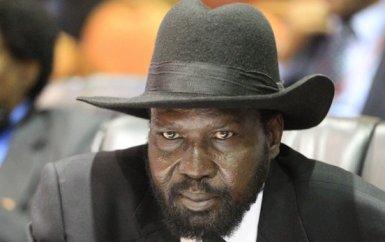S. Sudan president accepts internal reconciliation within ruling party
June 13, 2014 (JUBA) – South Sudanese President Salva Kiir has agreed to internal discussions and reconciliation within the leadership of his governing Sudan People’s Liberation Movement (SPLM), describing it as one of the biggest strengths of the party since its establishment.

“The president had a historic meeting twice with the former detainees. It was a response to the initiative by these comrades. They requested a meeting with the president and he accepted,” minister in the office of the president Awan Guol Riak told reporters in Juba on Thursday.
At the meeting were former cabinet affairs minister Deng Alor Kuol, former justice minister John Luk Jok, former finance minister Kosti Manibe and former SPLM secretary-general Pagan Amum.
“The president welcomed the initiative by these comrades and expressed [a] readiness to work for the realisation of peace and reconciliation of the SPLM leaders so that there is a peace and stability in the country, which is very important starting point for us as a government [and] as a party. Because the people who are dying now are South Sudanese,” Riak said.
The groups of four were among 11 senior political figures detained by the government in connection to an alleged coup plot masterminded by former vice-president Riek Machar to overthrow the Kiir administration. All of the former detainees have denied the claims.
In April, the government announced it was dropping treason charges against the group of four. The decision came after the earlier release of seven other detainees, who subsequently left the country.
Meanwhile, in a separate interview on Friday, Kuol confirmed that he and three other colleagues, all of whom are members of the political bureau, had met with Kiir as part of an initiative for internal reconciliation spearheaded by the Intergovernmental Governmental Authority (IGAD), which is mediating peace negotiations.
“It is in the interest of our people to end this conflict, which we believe has no loser or winner,” Kuol told Sudan Tribune.
“The differences can only be resolved through peaceful dialogue and this is where we have exerted our efforts. We need the peace in our country, which must be preceded by internal reconciliation,” he added.
Kuol commended president Kiir for accepting the initiative and inviting the group to return to the country, saying unity within the SPLM leadership would help stimulate ongoing peace negotiations.
“President Salva [Kiir] himself stated clearly that the spirit of readiness to reconcile our differences … has been one of the beautiful cultures and strength[s] of the SPLM since [its] inception, which is true,” Kuol said.
Kuol clarified that the intra-party reconciliation is received backing by both the Ethiopian and South African ruling parties within the context of addressing the root cause of the conflict in the country, which erupted in mid-December last year following an internal split within the SPLM.
It remains unclear, however, whether the initiative will extend to the rebel SPLM in Opposition, led by former vice-president Riek Machar, with observers expressing strong doubts over the possibility.
The status of the political detainees proved a major stumbling block during peace negotiations between the South Sudanese government and rebel forces loyal to Machar.
Despite mounting international pressure, Juba steadfastly refused to release the senior political officials, many of whom were sacked in July last year after becoming increasingly critical of Kiir’s leadership style.
The former detainees, however, decided against aligning themselves with either of the rival sides, instead opting to form a separate third bloc.
Following their release, the group of seven took part in IGAD-led peace talks before being suspended from participating.
The move followed calls from the South Sudanese government to restrict talks to the parties directly involved in the conflict.
(ST)
